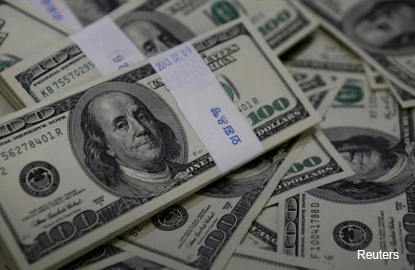
LONDON (Feb 15): The dollar chalked up its 11th straight daily rise on Wednesday, as investors' focus moved to inflation data in the United States for more support for the idea of a rise in Federal Reserve interest rates next month.
European trade in the major currencies was dominated by dips for the Swedish crown and sterling, after the Riksbank and a report on the UK labour market sounded cautious notes on their respective economic outlooks.
Fed chief Janet Yellen testifies for a second day in Congress after spurring more gains for the dollar on Tuesday by telling lawmakers that the U.S. central bank would consider raising rates at one of its "upcoming" meetings.
For markets that pointed to a hike in either March or May. It also opens the door to the Fed raising the return for holding dollars more than twice before the end of the year, beyond what investors have currently priced into short-term interest rates.
Consumer inflation is forecast to have risen to 2.4% in January and producer price numbers on Tuesday were generally higher than expected. The dollar's run of daily gains is now its longest since the peak of the euro zone's debt crisis in 2012.
"After Yellen's testimony, CPI data are the pick of the week for the U.S.," said Elsa Lignos, senior currency strategist with RBC Capital Markets. "The risks are skewed to a higher print, particularly given the consumer component from yesterday's strong PPI data."
The CME FedWatch indicator puts the chances of a rise in March at just 17%, but some market participants say the pricing of market interest rates points to odds of 30 percent or more, rising to more than 50% for May.
The dollar index, which measures the currency against its six major peers, was last up 0.2% at 101.43, its highest since Jan 20. It rose 0.3% to 114.58 yen and US$1.0552 per euro.
"It is all about the dollar for now," analysts from Bank of America Merrill Lynch said in a report forecasting the euro to weaken to US$1.02 in the months ahead. "We expect U.S. fiscal stimulus, which together with political risks in Europe should help to weaken the euro in the first half of the year."
Like a number of other major investment houses, it was less confident, however, about the dollar's ability to push past parity after a series of failures over the past two years.
While the dollar has gained steadily so far in February, the enthusiasm among investors that drove it higher, after Donald Trump's election, assuming he would reflate the U.S. economy, has been muted by concerns over protectionist trade policy and his attitude to the dollar.
The row over national security adviser Mike Flynn this week has only added to that political noise.
"It's the policy mix that has troubled us since the election, this trade off between 'good' dollar policies and other policies that are more problematic for the currency," said Paul Meggyesi, a strategist with JP Morgan in London.
"We did flip two weeks ago to a modest net short against the franc and the yen. Chances are the dollar, as it has been doing in recent weeks, will drift around in a tight consolidative range."